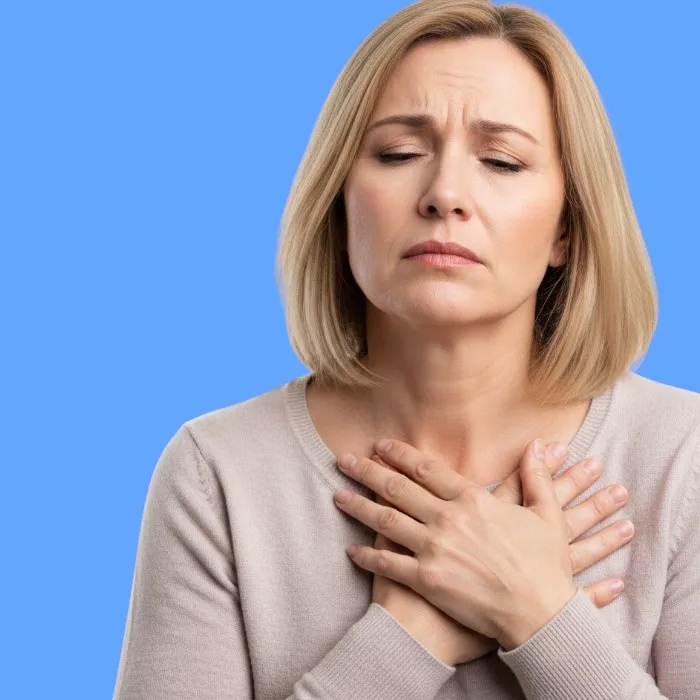What is atrial fibrillation?
Atrial fibrillation is a common heart rhythm disorder that occurs when the two upper chambers of the heart (the atria) beat irregularly and rapidly, affecting the efficiency of blood pumping.
In some cases, the patient may not feel any symptoms, while in others, heart palpitations, shortness of breath, or dizziness may appear suddenly and repeatedly.
What are the causes of atrial fibrillation?
There are several common causes of the condition, including:
- Chronic high blood pressure.
- Heart valve diseases.
- Congestive heart failure.
- Thyroid disorders.
- Obesity or being overweight.
- Smoking.
- Severe physical or emotional stress.
- Diabetes.
What are the common symptoms of atrial fibrillation?

There are several symptoms that patients may experience, including:
- Heart palpitations or irregular heartbeat sensations.
- Shortness of breath.
- Dizziness or lightheadedness.
- General body weakness.
- Chest pain.
- Quick fatigue with minimal effort.
- Difficulty concentrating or feeling confused.
- Low blood pressure.
When should you see a doctor?
It is advised to consult a doctor immediately if any of the following occur:
- Persistent heart palpitations lasting more than a few minutes.
- Sudden chest pain.
- Loss of consciousness or fainting.
- Severe shortness of breath.
- Frequent recurrence of symptoms.
- History of heart disease or stroke.
- Inability to perform normal daily activities.
What are the treatment options for atrial fibrillation?
There are several treatment methods for the condition, including:
- Medications to regulate heart rhythm.
- Blood thinners to reduce the risk of clots.
- Electrical cardioversion.
- Cardiac catheterization to isolate abnormal electrical signals.
- Lifestyle changes (such as reducing caffeine and quitting smoking).
- Treating underlying causes like thyroid disorders.
- Regular follow-up with a cardiologist.
Can atrial fibrillation be cured?
Complete recovery from atrial fibrillation depends on the type and cause of the condition. Some cases are temporary and respond quickly to treatment.
In other cases, the patient may require ongoing treatment to control symptoms and reduce complications, but it is possible to live normally with the condition.
What are the prevention tips for atrial fibrillation?
There are several tips to help prevent the condition, including:
- Maintaining normal blood pressure levels.
- Avoiding smoking and alcohol.
- Exercising regularly.
- Eating a healthy and balanced diet.
- Reducing stress and emotional strain.
- Monitoring blood sugar and cholesterol levels.
- Treating thyroid disorders.
- Getting good sleep and treating sleep apnea.
- Avoiding excessive stimulants like caffeine.
- Adhering to prescribed medications.
What are the possible complications of atrial fibrillation?
Some complications may occur if the condition is left untreated, such as:
- Stroke due to blood clots.
- Chronic heart failure.
- Weakening of the heart muscle.
- Other heart rhythm disorders.
- Reduced ability to perform daily activities.
- Concentration and memory problems.
- Psychological deterioration due to persistent symptoms.
Common questions about atrial fibrillation
Is atrial fibrillation dangerous?
Yes, if untreated, it may lead to serious complications like stroke.
Can atrial fibrillation go away on its own?
In some temporary cases, yes, but it often requires treatment.
Does atrial fibrillation affect young people?
Rarely, but it can happen especially with risk factors.
Does atrial fibrillation cause chest pain?
Yes, and the pain may indicate complications.
Article summary
Atrial fibrillation is a heart rhythm disorder that may be temporary or permanent, affecting blood pumping efficiency. Its symptoms vary and can be serious if untreated, such as stroke or heart failure.
Prevention starts with a healthy lifestyle, and medical follow-up is essential to control the condition and avoid complications.